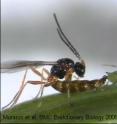Find the aphid
By leaving the remains of their old exoskeletons, called 'exuviae', in and around their colonies, aphids gain some measure of protection from parasites. Research published in the open access journal BMC Evolutionary Biology has shown that parasitoid wasps are likely to attack the empty shells, resulting in a lower attack rate on their previous occupants – much like in the popular 'shell game' confidence trick. Frédéric Muratori and his collaborators from the Université catholique de Louvain, Belgium, and McGill University, Canada, studied the insects in an effort to explain the aphids' tendency to leave exuviae around their colonies, behaviour the authors describe as 'bad housekeeping'. He said, "By leaving exuviae around the colony, aphids make detection easier for the parasite wasps. As such, this behaviour has been thought counter-selective. Here we show that the exuviae act as a decoy, and the time the wasps spend investigating the old shells limits the damage done to the aphid population".
Aphidiinae wasps use an ovipositor at the rear of their abdomen to lay their eggs inside aphids. Eventually, the development of the parasitoid larva is fatal for the aphid concerned. The authors predicted that the areas littered with exuviae decoys would be seen as poor hunting grounds by the wasps who would move on to other patches. In fact, Muratori describes how, "We found that parasitoid females spent more time in patches that contained exuviae than in patches that contained only aphids, suggesting that these females either did not recognize exuviae as low quality hosts or needed time to correctly identify them".
The potential gain for the individual aphids comes from the increased time available to escape from the colony while the wasps are investigating the decoys. According to the authors, "Aphids release an alarm pheromone when they are under parasitoid attack, giving other aphids time to escape. In nature this is achieved by dropping off the plant".
Source: BioMed Central
Other sources
- Find the aphid: Molted carapaces act as protective decoys for aphidsfrom PhysorgFri, 19 Dec 2008, 10:28:28 UTC
